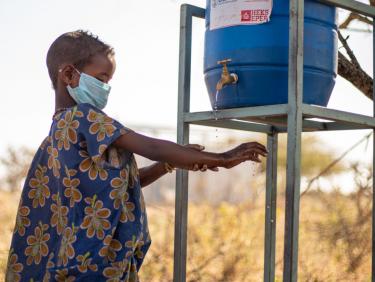


In the spring of 2020 the coronavirus turned the world on its head and changed all our lives, in one way or another. The medium and long-term impacts of the pandemic, which are only now becoming apparent and perceptible, pose an existential threat to many in Switzerland and abroad. In Switzerland and through its projects around the world, HEKS/EPER is committed to assisting these people over the long term.
HEKS/EPER's international projects support various sanitation and awareness-raising measures to protect particularly vulnerable people from the virus. In parallel, the medium and long-term economic effects of the Covid-19 pandemic on our project beneficiaries should be specifically studied and tackled through appropriate project components.
In Switzerland HEKS/EPER stands by people who for various reasons find themselves among the most vulnerable in our society. They include older migrants, sans-papiers (undocumented people), refugees, the long-term unemployed, and people experiencing homelessness or problems of addiction. Job losses and social distancing are making it even harder for these people to establish social contacts. HEKS/EPER is assisting them in coping with this difficult time of social isolation, in claiming their rights, or in finding work again.

The economic impacts of the corona crisis have compounded the plight of many Dalit and Adivasi communities, who were already living on the breadline. In order to survive during the nationwide lockdown, many had to sell all their belongings. A HEKS/EPER aid and rehabilitation project is assisting Adivasi, Dalit and other underprivileged households by providing them with cash, poultry or agricultural goods to enable them to rebuild their livelihoods.

Numerous older migrants in Switzerland fall into a risk group and experience social isolation. For them, accessing public schemes is complicated by language barriers and unfamiliarity with the social system. HEKS/EPER keeps in touch with migrants 55 years and over, informs them in several languages and trains them in the use of digital media, thus helping them to escape social isolation.

To curb the spread of the virus in Venezuela, HEKS/EPER is working jointly with a local health organisation to disinfect Latin America’s largest university hospital, located in Caracas. In the next project phase, HEKS/EPER is now expanding the disinfection measures to other parts of the country, especially to poorly equipped health centres in the regions bordering on Colombia.

Housekeeping industry workers generally live with a great degree of existential and job insecurity. The pandemic has now left them even worse off. In the Canton of Vaud, HEKS/EPER informs domestic workers about their rights, reminds employers of their legal obligations and offers administrative assistance to those wishing to register their employees with the social security system.

HEKS/EPER has taken several steps to enable the people in the Grand'Anse region to better protect themselves against the virus. Protective mask production, for example, was launched in cooperation with local sewing studios, and public institutions such as hospitals and prisons were supplied with hygiene packages containing soap, chlorine and protective material. There is now a new project dedicated specifically to building and upgrading drinking water and sanitation infrastructure at schools and local marketplaces.

Many sans-papiers (undocumented people) and migrants work in private homes for hourly wages. A number of them lost their jobs owing to the corona crisis and are still out of work. Their plight is an existential one. In Geneva, HEKS/EPER is informing affected persons in several languages about their rights as workers and the help available to them. Moreover, HEKS/EPER also arranges for them to receive «Colis du Coeur» food coupons.

To prevent the spread of Covid-19 in the Rohingya refugee camps, HEKS/EPER is working with health institutions to install sanitation infrastructure and is also training health workers. Under a cash-for-work programme, refugees are being helped to improve and repair their accommodations as well as camp infrastructure such as roads leading to health facilities.

The corona pandemic is making it especially hard for parents with a migration background, a low level of education or scant knowledge of the national language to support their children's development in the best way possible. In the cantons of Basel and Vaud, HEKS/EPER therefore provides counselling and guidance in several languages for these parents, by phone or via WhatsApp, and also sends out computer tips and ideas for their children's leisure activities.

Syria's health authorities lack the wherewithal to respond adequately to Covid-19. There is a generalised shortage, including of medical staff, personal protective equipment, tests and toiletries. Jointly with its Syrian partner organizations, HEKS/EPER is assisting internally displaced and other highly vulnerable people with supplies of food, toiletries and protective equipment.

In Ethiopia, HEKS/EPER is securing village water supply systems by building reservoirs, pipelines and water points. It is also improving sanitation at primary schools and health centres by installing water main connections and latrines. School children are also being taught good hygiene practices.
We continue to depend on your support in order to master the manifold challenges. With your donation you will protect the most needy from the dramatic consequences of the Corona pandemic.
